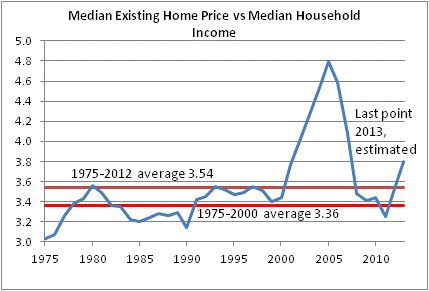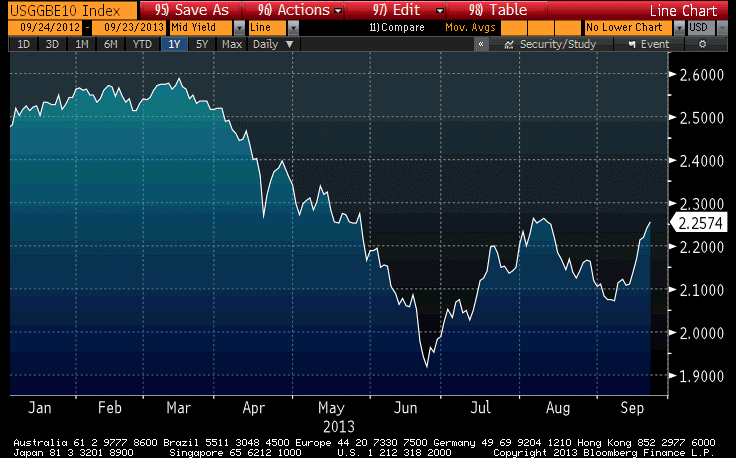Now, now, children! Stop fighting! This is unbecoming!
It is apparent now that the disagreements in the FOMC – while nothing new – are becoming more significant and the hurly-burly is spilling into the public eye. It is somewhat amazing to me that the Fed is allowing this argument to be conducted in public (traditionally, all remarks by Fed officials are first vetted by the Chairman’s office). Yesterday Dallas Fed President Richard Fisher actually questioned the Fed’s credibility! This article is worth reading, and not just for the part where Fisher says that Yellen is “dead wrong on policy.” It’s also fascinating that Fisher attributed the decision to delay the taper to “a perceived ‘tenderness’” in the housing recovery.
Below is a chart (source: Enduring Investments) of the ratio of median existing home sale prices to median household income. If this is “tenderness” in a recovery, it only shows a lack of knowledge of history: this is the second highest ratio of home prices to income we have since this particular data begins…and the first highest ratio sunk the global economy for a half-decade and counting.
On the other side of the fence were the New York Fed’s Bill Dudley and the Atlanta Fed’s Dennis Lockhart, who lamented that (Dudley) there has been no pickup in the economy’s “forward momentum” and asked (Lockhart) “Is America losing its economic mojo?” These questions, and the result of these questions during the recent FOMC meeting, illustrate two points. First, that the bar for removing never-before-seen levels of monetary accommodation has been raised so high that doves believe it is appropriate to keep the foot on the accelerator until growth is drastically above-average. As I illustrated back at the beginning of August, it is unreasonable to expect more than about 200,000 new jobs per month to be created by the economy. Repairing all of the damage is simply going to take time. We would all love to see 5% growth, but is the Fed’s job really to make sure that happens, or to try and manage the downside (or, as I personally believe, to merely manage the price level)?
The second point that the Fisher/Dudley/Lockhart comments illustrate is that the doves at the Fed are clearly in control. The hawks were completely unable even to get a marginal tapering, although the Fed had clearly indicated previously that such a taper was likely to happen.
It is a Dudley/Bernanke/Yellen Fed (and they have allies too!), and anyone who thinks that the Fed is abruptly going to find religion once CPI peeks above 2% is fighting against all historical indications. One need only consider the fact that the post-FOMC meeting statement pointed out a “tightening of financial conditions observed in recent months,” a clear reference to the rapid rise in interest rates that accompanied the initial talk about tapering. But if the Fed begged off on the taper partly because of the tightening of financial conditions, that is the rise in interest rates that was caused by an expectation that the taper would stop, then the argument circular, isn’t it? It’s impossible for them to stop, since any indication that they were going to stop is obviously going to cause interest rates to rise, which would be a tightening of financial conditions, which would keep them from stopping… Does anyone seriously think that a core inflation print of 2.1% would change that?
To the extent that cutting from 20 cups of coffee per day to 19 cups of coffee per day could be called a “bold step,” wouldn’t the best time to take such a “bold step” with monetary policy be when the equity markets are at their highs and real estate markets back above their long-term value anchors?
And yet, the initial enthusiasm for the stock market for the continuation of QE seems to have faded rapidly. The entire post-FOMC rally that caused such joy around the offices of CNBC last Wednesday has been erased. Interestingly, the initial spike in commodities prices has also been erased, which is more curious since commodities prices don’t depend on growth as much as they do on inflation. And 10-year inflation expectations are back around 2.25%, basically the highest level they have seen since the Q2 swoon (see chart, source Bloomberg). So, as usual, I am flummoxed by the behavior of commodities. 
I know that there is a great deal of confidence in some quarters that the Federal Reserve can keep its foot on the gas until such time as inflation actually rises to a level that concerns them. I cannot imagine the reason for such confidence when the drivers of the car are such committed doves. There are multiple problems undermining my confidence in such a possibility. There is the “Wesbury hypothesis” that the Fed will adjust its definition of what worries them about inflation – a hypothesis which, after this month’s FOMC meeting, should be even more compelling. There is the fact that there is no evidence I am aware of that the Fed was able to easily restrain inflation after it came unglued in any prior episode (and no one knows where and when and how it will come unglued). And finally, it isn’t clear to me how the Fed would go about restraining inflation anyway, given the overabundance of excess reserves and the fact that those reserves insulate any inflation process against the tender ministrations of the central bank.
One thing seems to be sure. The food fight at the Fed is not likely to end soon, and together with the dysfunction on Capitol Hill is raises the very real question of whether anything economically helpful is going to be accomplished in Washington DC this year.
- English (UK)
- English (India)
- English (Canada)
- English (Australia)
- English (South Africa)
- English (Philippines)
- English (Nigeria)
- Deutsch
- Español (España)
- Español (México)
- Français
- Italiano
- Nederlands
- Português (Portugal)
- Polski
- Português (Brasil)
- Русский
- Türkçe
- العربية
- Ελληνικά
- Svenska
- Suomi
- עברית
- 日本語
- 한국어
- 简体中文
- 繁體中文
- Bahasa Indonesia
- Bahasa Melayu
- ไทย
- Tiếng Việt
- हिंदी
'Food Fight' At The Fed
Published 09/24/2013, 12:10 AM
Updated 02/22/2024, 09:00 AM
'Food Fight' At The Fed
3rd party Ad. Not an offer or recommendation by Investing.com. See disclosure here or
remove ads
.
Latest comments
Install Our App
Risk Disclosure: Trading in financial instruments and/or cryptocurrencies involves high risks including the risk of losing some, or all, of your investment amount, and may not be suitable for all investors. Prices of cryptocurrencies are extremely volatile and may be affected by external factors such as financial, regulatory or political events. Trading on margin increases the financial risks.
Before deciding to trade in financial instrument or cryptocurrencies you should be fully informed of the risks and costs associated with trading the financial markets, carefully consider your investment objectives, level of experience, and risk appetite, and seek professional advice where needed.
Fusion Media would like to remind you that the data contained in this website is not necessarily real-time nor accurate. The data and prices on the website are not necessarily provided by any market or exchange, but may be provided by market makers, and so prices may not be accurate and may differ from the actual price at any given market, meaning prices are indicative and not appropriate for trading purposes. Fusion Media and any provider of the data contained in this website will not accept liability for any loss or damage as a result of your trading, or your reliance on the information contained within this website.
It is prohibited to use, store, reproduce, display, modify, transmit or distribute the data contained in this website without the explicit prior written permission of Fusion Media and/or the data provider. All intellectual property rights are reserved by the providers and/or the exchange providing the data contained in this website.
Fusion Media may be compensated by the advertisers that appear on the website, based on your interaction with the advertisements or advertisers.
Before deciding to trade in financial instrument or cryptocurrencies you should be fully informed of the risks and costs associated with trading the financial markets, carefully consider your investment objectives, level of experience, and risk appetite, and seek professional advice where needed.
Fusion Media would like to remind you that the data contained in this website is not necessarily real-time nor accurate. The data and prices on the website are not necessarily provided by any market or exchange, but may be provided by market makers, and so prices may not be accurate and may differ from the actual price at any given market, meaning prices are indicative and not appropriate for trading purposes. Fusion Media and any provider of the data contained in this website will not accept liability for any loss or damage as a result of your trading, or your reliance on the information contained within this website.
It is prohibited to use, store, reproduce, display, modify, transmit or distribute the data contained in this website without the explicit prior written permission of Fusion Media and/or the data provider. All intellectual property rights are reserved by the providers and/or the exchange providing the data contained in this website.
Fusion Media may be compensated by the advertisers that appear on the website, based on your interaction with the advertisements or advertisers.
© 2007-2024 - Fusion Media Limited. All Rights Reserved.
